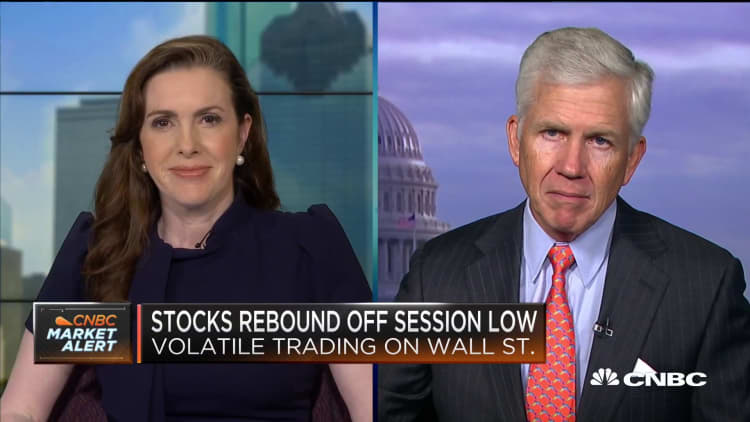The coronavirus is likely to exert a much smaller human and economic toll than current appearances suggest, according to a Morningstar analysis that runs contrary to some of the gloomier forecasts that have helped pound the stock market.
While the near-term damage is likely to be more substantial, the longer-run impact to global GDP is likely to be just 0.2%, the financial services firm widely followed for its fund ratings said in a lengthy report.
"Overall, we see a weighted average hit of 1.5% to 2020 global GDP and 0.2% to long-run global GDP," said the report authored by biotech strategist Karen Anderson and energy analyst Preston Caldwell. "We forecast a muted long-term impact because damage to productive capacity will be small, plus economic confidence should quickly return once the virus subsides."
Other forecasters have not been as optimistic.
Pimco, the asset management giant, said this week that it expects a "technical recession" in the first part of the year, TS Lombard predicts a "major recession" globally, and Bank of America Global Research knocked back its global growth forecast again to 2.2%.
But Morningstar said the economic impact shouldn't be as bad because the disease's impact will be less pronounced.
Based on studies of previous pandemics — a designation the COVID-19 strain has not yet received — Morningstar estimated that the ultimate mortality rate will be about 0.5%. While that's well above the level of the flu, it's considerably below the current 3.5% rate that shows up in the latest data tracking from Johns Hopkins University.
Once the data gets more complete as additional cases are diagnosed through testing, that current number is expected to come down significantly. The analysts say they see the coronavirus impact "to resemble a severe but manageable flu."
Market drop a 'gross overreaction'
"We expect even lower fatality rates for developed countries (more ICU beds per capita, best practices) and the working age population (the disease is most severe in the elderly)," the authors said. "We see reason for optimism surrounding vaccines and treatments."
Markets, though, have been in tumult since the virus spread more aggressively in February. Investors worry that precautions such as quarantining and social avoidance will depress economic activity as the global spread cuts off vital supply chains and encourages hoarding.
But Morningstar forecasts that as vaccines come online and treatment gets better, the economic disruption will be equal to a "milder pandemic" as based on studies of swine flu, SARS and other similar situations. The firm says the market plunge, which has taken major averages near the 20% decline required for a bear market, is overdone.
"Although we project a grim set of scenarios in terms of fatalities in our analysis, our view on the economic impact is much more sanguine," the report said. Anderson and Caldwell added that "equity valuations on average should be unscathed if our long-term projections on GDP are correct. Therefore, we think a 10%+ fall in global equities since the outbreak began is a gross overreaction."
Still, the firm sees a substantial human toll — 8 million deaths globally, including some 200,000 in the U.S., well above high-end forecast for the flu of 61,000.
Morningstar said the U.S. reaction has been "slow and disorganized" though it is likely to see "rapid improvements" ahead as testing spreads and adjustments are made.
"We are likely much more prepared for the taxing of our hospital system, as we appear to have a massive lead over other developed nations in the number of ICU beds per citizen," the analysts said. "This should further lower the economic impact, even if global death rates are much higher than recent pandemics."



